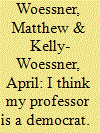| Srl | Item |
| 1 |
ID:
092554


|
|
|
|
|
| Publication |
2009.
|
| Summary/Abstract |
Notwithstanding political science professors' concerted efforts to remain politically neutral in the classroom, we find evidence that students are able to successfully identify the partisan loyalties of their professors. Furthermore, we find that there is a tendency for students to drift toward the Democratic Party over the course of the semester, yet the direction of the shift appears to be unrelated to either the instructor's actual political loyalties, or to the student's perception of the professor's partisan preferences. Given that political science professors appear to exert no real influence on students' party loyalties, it is unclear whether efforts to diversify the field by hiring more Republican professors would actually reduce the "liberalizing" effects of higher education.
|
|
|
|
|
|
|
|
|
|
|
|
|
|
|
|
| 2 |
ID:
175297


|
|
|
|
|
| Summary/Abstract |
In considering the liberalizing effect of college on students’ political values, we argue that political identities—in the form of self-identified ideology or partisanship—are components of social identity and are resistant to change. Using data from the Higher Education Research Institute’s student surveys, we show that what movement in identity does occur is mostly a regression to the mean effect. On several issue positions, however, students move in a more uniform leftward direction. We find that liberal drift on issues is most common among students majoring in the arts and humanities. Self-reported ideology does drift left at liberal arts colleges, but this is explained by a peer effect: students at liberal arts colleges drift more to the left because they have more liberal peers. The results have implications for future research on college student political development, suggesting that attitudinal change can be more easily identified by examining shifts in policy preferences rather than changes in political identity.
|
|
|
|
|
|
|
|
|
|
|
|
|
|
|
|